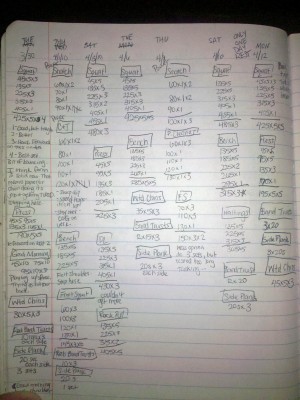Training logs are important for several reasons. Keeping a long term log shows the lifter how much progress they have made over time. It also gives immediate input on the last few workouts specifically the warm up strategy and what the last work sets were. They also give the lifter an opportunity to add in useful comments like, “maximum jackage occurred today” or “it’s like I’m on fucking D-bol”.
A tangible training log that can be carried to the gym will be most effective since there is the potential of not remembering everything that previously occurred. It also allows instant emotions to be dictated to the log, such as, “my traps are mos def gettin’ their SWOLE on”.
Aside from warm-up sets, work sets, and awesome comments, there are some additional metrics that are beneficial to record. These ancillary metrics are optional, but they give a measure of how the body feels in a training program. If the lifter consistently records how they are feeling prior to training, over time they may observe that they became overtrained. There’s a difference in recording, “I’m tired” and “I wanna beat ’em!”
The rating of perceived exertion (RPE) scale can also be utilized for individual exercises. In such a case, if a 1 rep max (1RM) is known, then it will be considered a ’10’ on the RPE. There should be nothing left after a 10 rated lift, and if the bar path is deviated to the smallest degree, the lift will end in failure. If a lifter doesn’t want to deal with numbers, they can just use subjective terms, such as Brent’s “ez pz” for a set that is, oddly enough, “easy”. I remember recording “Very. Fucking. Hard.” after doing heavy sets of squats. If there is a gauge on heavier lifts, then the lifter will know how difficult they were months later when they are figuring out how well they adapted to their program, given the circumstances.
Speaking of which, other circumstances would include food, sleep, stress, time management issues – basically anything that would deter training from occurring as normal. I typically reserve comments on these issues if something is askew because there isn’t much of a point in saying, “No stress in life today, aside from Brent trolling the fuck out of me.”
If you haven’t been keeping a log because you’re lazy, then it’d be good to start doing so. Even if you aren’t following a strict program, having a log and being able to review your non-program will still be descriptive in letting you know what has been working or what hasn’t been working. Besides, if you don’t know what you’ve been doing, then you can’t figure out what you’ve been doing wrong when the shit hits the fan.
Here is a page out of my log to give you an idea of how it is structured and how I annotate different things. It is from earlier this year when I was working on rehabbing my back and regaining strength.
———-
There is an IPF survey going around that could potentially affect the bench, squat, refeering, weight class changes, age categories, and more. If you give a damn about powerlifting under IPF ruling (like if you compete in USAPL), then go take the survey.
http://www.surveymonkey.com/s/JTHYB7X
Personally I think the survey is a little vague, but oh well.

